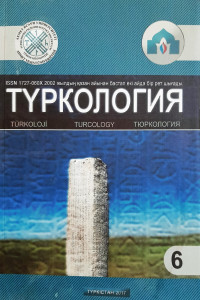MİTOLOJİDE SU UNSURU VE ONUN KÖROĞLU HİKAYESİNE YANSIMASI
Öz
En eski dönemlerden insanlar suya, suyun kutsallığına inanmışlardır. Kaynaklarda Türk kabilelerinin ilkbaharda suya tapma işareti olarak elbiseleriyle suya girmedikleri yazılır. Bu dönemde insanlar özel ritüellerle Tanrı`dan bol su, yağmur istiyorlardı.
Zerdüştilik`e bağlı olmayarak Türk`ler Ateş`e müracaat etmeden önce su Tanrısının adını söylerlerdi. Daha sonraki kültürlerde de suyla konuşma, suya tapınma, sudan yardım dileme gibi konuların mitolojik anlamda geniş uygulanma alanı olmuştur.
Dede Korkut Kitabı`nda Kazan Han suya hitâben “Su Hak didarın görmüştür. Ben bu suyla haberleşeyim” demiştir. Burada insanın ruhuyla su arasındaki ilişki açık şekilde görülmektedir. Köroğlu hikayesinde ise Köroğlu`nun hem çağlayan çifte çeşmeden çıkan suyun peşinden gitmesi, hem o çeşmenin şifa verici olmasıyla, hem de Kırat`la Dürat`ın nehirden çıkması ile ilgili hikayelerde insanların eski düşüncelerindeki suyun anlamına, ona verdikleri öneme işaret ediyor.
Makalede eski mitolojik kültürlerdeki bakış açısından su unsurunun yeri ve Köroğlu hikayesine yansımasından söz edilecektir.
Anahtar Kelimeler
Kaynakça
- 1. Ali Polad. Bir damla su III. İstanbul, 2011
- 2. Boratav P.N. Köroğlu Destanı. İstanbul, 1931
- 3. İsmayılova Y. “Köroğlu Destanı”nda obrazlar sistemi. Bakı, 2003
- 4. Kitabi-Dede Korkut (tertib edeni: S.Alizade). Bakı, 2004
- 5. Köroğlu (tertip edeni: M.H.Tehmasib), Bakı, 1956
- 6. Köroğlu. Paris nushası (tertib edeni: İ.Abbaslı). Bakı, 1997
- 7. Köroğlu. Tiflis nushası (tertib edeni: E.Tofik kızı). Bakı, 2005
- 8. Mehemmed Fuzuli. Eserleri. Altı ciltte. V cilt, Bakı, 2005
- 9. Ögel B. Türk mitolojisi (Kaynakları ve Açıklamaları ile Destanlar). I cilt, Ankara, 1989
- 10. Ögel B. Türk mitolojisi (Kaynakları ve Açıklamaları ile Destanlar). II cilt, Ankara, 1995
- 11. Seyidov M. Azerbaycan mifik tefekkürünün kaynakları. Bakı, 1983
- 12. Tehmasib M.H. Azerbaycan Halk Destanları (Orta asırlar). Bakı, 1972
- 13. Аверинцев С.С. Вода. Мифы народов мира. В 2-х томах, Том 1. Москва, 1980
- 14. Мелетинский Е.М. Поэтика мифа. Москва, «Восточная литература» РАН, 2000
- 15. Элиаде М. Аспекты мифа. Москва, Академический проект, 2001
- 16. Малов С.Е. Памятники древнетюркской письменности. Москва-Ленинград, Наука, 1951
- 17. Анохин А. В. Материалы по шаманству у алтайцев, собр. во вр. путеш. по Алтаю / СМАЭ АН СССР, т. 4, вып. 2, Ленинград, 1924
- 18. Elyazması, inventar № 715 (q), Mehter Alı, AMEA Folklor İnstitutunun elmi arhivi.
- 19. Elyazması, inventar № 715. Toplayanı M.Velizade, 1936, AMEA Folklor İnstitutunun elmi arhivi.
- 20. Dede Korkud Kitabı. Ensiklopedik lüğet. "Önder neşriyyat", Bakı, 2004
- 21. Kitabi-Dede Korkud Ensiklopediyası, 2 ciltde, I cilt, Bakı, Yeni Nəşrlər Evi, 2000
- 22. http://dede.musigi-dunya.az/a/at.html
THE WATER ELEMENT IN MYTHOLOGY AND ITS REFLECTION IN THE EPOS KOROGLU
Öz
The ancient people had believed in water and its holiness. In the sources it is noted that Turkic tribes believing in holy water did not enter the water in their clothes. During those times the people asked God much water, rain with special rituals. Not being close to the Zoroastrianism Turks told the name of Water God before asking to the fire. Later in other cultures to speak to the water, to believe it and ask for help also were applied in mythological branch.
In the book “Dede-Gorgud” addressing to the water Gazan Khan told that “The water had seen the God. Let me ask it”. Here the relation between the soul of the man and water are seen clearly. But in the epos “Koroglu” the tales about Koroglu’s going after the water purling from the pair springs, its recovery being, appearing Girat and Durat from the sea are noted to the meaning of the water of the ancient thinking of the people.
In the article the place and appearance of water element in Koroglu epos from the view of the ancient mythological cultures will be pointed out.
Anahtar Kelimeler
Kaynakça
- 1. Ali Polad. Bir damla su III. İstanbul, 2011
- 2. Boratav P.N. Köroğlu Destanı. İstanbul, 1931
- 3. İsmayılova Y. “Köroğlu Destanı”nda obrazlar sistemi. Bakı, 2003
- 4. Kitabi-Dede Korkut (tertib edeni: S.Alizade). Bakı, 2004
- 5. Köroğlu (tertip edeni: M.H.Tehmasib), Bakı, 1956
- 6. Köroğlu. Paris nushası (tertib edeni: İ.Abbaslı). Bakı, 1997
- 7. Köroğlu. Tiflis nushası (tertib edeni: E.Tofik kızı). Bakı, 2005
- 8. Mehemmed Fuzuli. Eserleri. Altı ciltte. V cilt, Bakı, 2005
- 9. Ögel B. Türk mitolojisi (Kaynakları ve Açıklamaları ile Destanlar). I cilt, Ankara, 1989
- 10. Ögel B. Türk mitolojisi (Kaynakları ve Açıklamaları ile Destanlar). II cilt, Ankara, 1995
- 11. Seyidov M. Azerbaycan mifik tefekkürünün kaynakları. Bakı, 1983
- 12. Tehmasib M.H. Azerbaycan Halk Destanları (Orta asırlar). Bakı, 1972
- 13. Аверинцев С.С. Вода. Мифы народов мира. В 2-х томах, Том 1. Москва, 1980
- 14. Мелетинский Е.М. Поэтика мифа. Москва, «Восточная литература» РАН, 2000
- 15. Элиаде М. Аспекты мифа. Москва, Академический проект, 2001
- 16. Малов С.Е. Памятники древнетюркской письменности. Москва-Ленинград, Наука, 1951
- 17. Анохин А. В. Материалы по шаманству у алтайцев, собр. во вр. путеш. по Алтаю / СМАЭ АН СССР, т. 4, вып. 2, Ленинград, 1924
- 18. Elyazması, inventar № 715 (q), Mehter Alı, AMEA Folklor İnstitutunun elmi arhivi.
- 19. Elyazması, inventar № 715. Toplayanı M.Velizade, 1936, AMEA Folklor İnstitutunun elmi arhivi.
- 20. Dede Korkud Kitabı. Ensiklopedik lüğet. "Önder neşriyyat", Bakı, 2004
- 21. Kitabi-Dede Korkud Ensiklopediyası, 2 ciltde, I cilt, Bakı, Yeni Nəşrlər Evi, 2000
- 22. http://dede.musigi-dunya.az/a/at.html
Ayrıntılar
| Birincil Dil | Türkçe |
|---|---|
| Konular | Sanat ve Edebiyat, Türk Halk Bilimi |
| Bölüm | Araştırma Makaleleri |
| Yazarlar | |
| Yayımlanma Tarihi | 25 Aralık 2017 |
| Yayımlandığı Sayı | Yıl 2017 Sayı: 86 |

